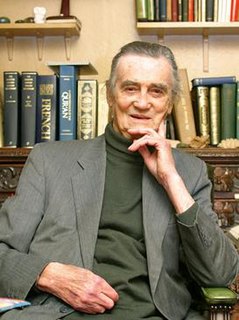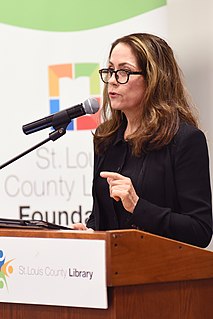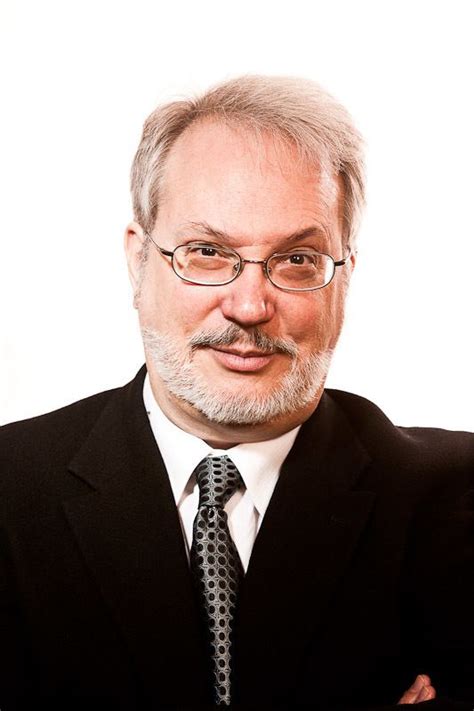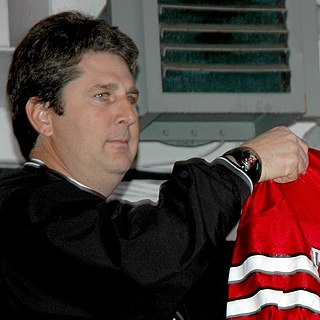Top 260 Agnostic Quotes & Sayings - Page 5
Explore popular Agnostic quotes.
Last updated on April 16, 2025.
The agnostic does not simply say, "l do not know." He goes another step, and he says, with great emphasis, that you do not know. He insists that you are trading on the ignorance of others, and on the fear of others. He is not satisfied with saying that you do not know, -- he demonstrates that you do not know, and he drives you from the field of fact -- he drives you from the realm of reason -- he drives you from the light, into the darkness of conjecture -- into the world of dreams and shadows, and he compels you to say, at last, that your faith has no foundation in fact.
Within the mystery of life there is the infinite darkness of the night sky lit by distant orbs of fire, the cobbled skin of an orange that releases its fragrance to our touch, the unfathomable depths of the eyes of our lover. No creation story, no religious system can fully describe or explain this richness and depth. Mystery is so every-present that no one can know for certain what will happen one hour from now. “ It does not matter whether you have religion or are an agnostic believe in nothing, You can only appreciate (without knowing or understanding) the mysteries of life.
The agnostic has a very curious notion of religion. He is convinced that a man who says 'I believe in God' should at once become perfect; if this does not happen, then the believer must be a fraud and a hypocrite. He thinks that adherence to a religion is the end of the road, whereas it is in fact only the beginning of a very long and sometimes very rough road. He looks for consistency in religious people, however aware he may be of inconsistencies in himself
I do not expect that the mere fact that I was once an evangelical apologist and now see things differently should itself count as evidence that I must be right. That would be the genetic fallacy. It would be just as erroneous to think that John Rankin must be right in having embraced evangelical Christianity since he had once been an agnostic Unitarian and repudiated it for the Christian faith.
I leave pansies, the symbolic flower of freethought, in memory of the Great Agnostic, Robert Ingersoll, who stood for equality, education, progress, free ideas and free lives, against the superstition and bigotry of religious dogma. We need men like him today more than ever. His writing still inspires us and challenges the 'better angels' of our nature, when people open their hearts and minds to his simple, honest humanity. Thank goodness he was here.
Today, if the CEO thinks it's a good idea, it's done everywhere; if the CEO thinks it's a bad idea, it's done nowhere. We ought to be more agnostic and open to learning things that we didn't expect - and the only way to do that is to try things and be open-minded about how well they are working. And third, evidence-based management involves reading and learning - just like doctors do - and to do so not just in school but afterward, as well.
Over time, I started becoming more aware of the vastness and complexity of the universe, which led me away from any sort of conventional Christianity. I still love the teachings of Christ, but I also believe that the human condition prevents us from having any true objective knowledge of the universe. All human belief systems are inherently flawed. If I had to label myself now, I'd call myself a Taoist-Christian-agnostic quantum mechanic. Also, there's nothing in the actual Bible that limits a Christian in their interest in science. Anti-science is a function of ignorant fundamentalism.
I am not agnostic. I am atheist. I don’t think there is no God; I know there’s no God. I know there’s no God the same way I know many other laws in our universe. I know there’s no God and I know most of the world knows that as well. They just won’t admit it because there’s another thing they know. They know they’re going to die and it freaks them out. So most people don’t have the courage to admit there’s no God and they know it. They feel it. They try to suppress it. And if you bring it up they get angry because it freaks them out.
I still don't like the word agnostic. It's too fancy. I'm simply not a believer. But, as simple as this notion is, it confuses some people. Someone wrote a Wikipedia entry about me, identifying me as an atheist because I'd said in a book I wrote that I wasn't a believer. I guess in a world uncomfortable with uncertainty, an unbeliever must be an atheist, and possibly an infidel. This gets us back to that most pressing of human questions: why do people worry so much about other people's holding beliefs other than their own?
Yes, I think I use the term radical rather loosely, just for emphasis. If you describe yourself as atheist some people will say, Don't you mean agnostic? I have to reply that I really do mean atheist, I really do not believe that there is a god; in fact, I am convinced that there is not a god (a subtle difference). I see not a shred of evidence to suggest that there is one...etc., etc. It's easier to say that I am a radical atheist, just to signal that I really mean it, have thought about it a great deal and that it's an opinion I hold seriously.
My personal attitude toward atheists is the same attitude that I have toward Christians, and would be governed by a very orthodox text: "By their fruits shall ye know them." I wouldn't judge a man by the presuppositions of his life, but only by the fruits of his life. And the fruits - the relevant fruits - are, I'd say, a sense of charity, a sense of proportion, a sense of justice. And whether the man is an atheist or a Christian, I would judge him by his fruits, and I have therefore many agnostic friends.
I suspect the reason is that most people [...] have a residue of feeling that Darwinian evolution isn't quite big enough to explain everything about life. All I can say as a biologist is that the feeling disappears progressively the more you read about and study what is known about life and evolution. I want to add one thing more. The more you understand the significance of evolution, the more you are pushed away from the agnostic position and towards atheism. Complex, statistically improbable things are by their nature more difficult to explain than simple, statistically probable things.
As a philosopher, if I were speaking to a purely philosophic audience I should say that I ought to describe myself as an Agnostic, because I do not think that there is a conclusive argument by which one can prove that there is not a God. On the other hand, if I am to convey the right impression to the ordinary man in the street I think that I ought to say that I am an Atheist, because, when I say that I cannot prove that there is not a God, I ought to add equally that I cannot prove that there are not the Homeric gods.
Religious faith in the case of the Hindus has never been allowed to run counter to scientific laws, moreover the former is never made a condition for the knowledge they teach, but there are always scrupulously careful to take into consideration the possibility that by reason both the agnostic and atheist may attain truth in their own way. Such tolerance may be surprising to religious believers in the West, but it is an integral part of Vedantic belief.
Both my parents were agnostic. My mother was kind of a Buddhist. She had some spiritual tendencies, but they were kind of flaky - New Agey, you know? Which is partly why I'm suspicious of that sort of thing. I'm skeptical of any spiritual practice that doesn't involve other people and doesn't involve some sort of consistent tradition.
I am an atheist, out and out. It took me a long time to say it. I've been an atheist for years and years, but somehow I felt it was intellectually unrespectable to say that one is an atheist, because it assumed knowledge that one didn't have. Somehow it was better to say one was a humanist or agnostic. I don't have the evidence to prove that God doesn't exist, but I so strongly suspect that he doesn't that I don't want to waste my time.
You get these Satanists types that don't believe in God. OK, so you realize you don't get Satan if you don't get God, right? Or atheists that want to believe in ghosts. Wait, wait, wait. You can't have a two-way go on that. You want to be agnostic, be an atheist, fine. But you don't bring ghosts along with you.
People will then often say, 'But surely it's better to remain an Agnostic just in case?' This, to me, suggests such a level of silliness and muddle that I usually edge out of the conversation rather than get sucked into it. (If it turns out that I've been wrong all along, and there is in fact a god, and if it further turned out that this kind of legalistic, cross-your-fingers-behind-your-back, Clintonian hair-splitting impressed him, then I think I would choose not to worship him anyway.)
The list of things about which we strictly have to be agnostic doesn't stop at tooth fairies and celestial teapots. It is infinite. If you want to believe in a particular one of them - teapots, unicorns, or tooth fairies, Thor or Yahweh - the onus is on you to say why you believe in it. The onus is not on the rest of us to say why we do not. We who are atheists are also a-fairyists, a-teapotists, and a-unicornists, but we don't have to bother saying so.

















